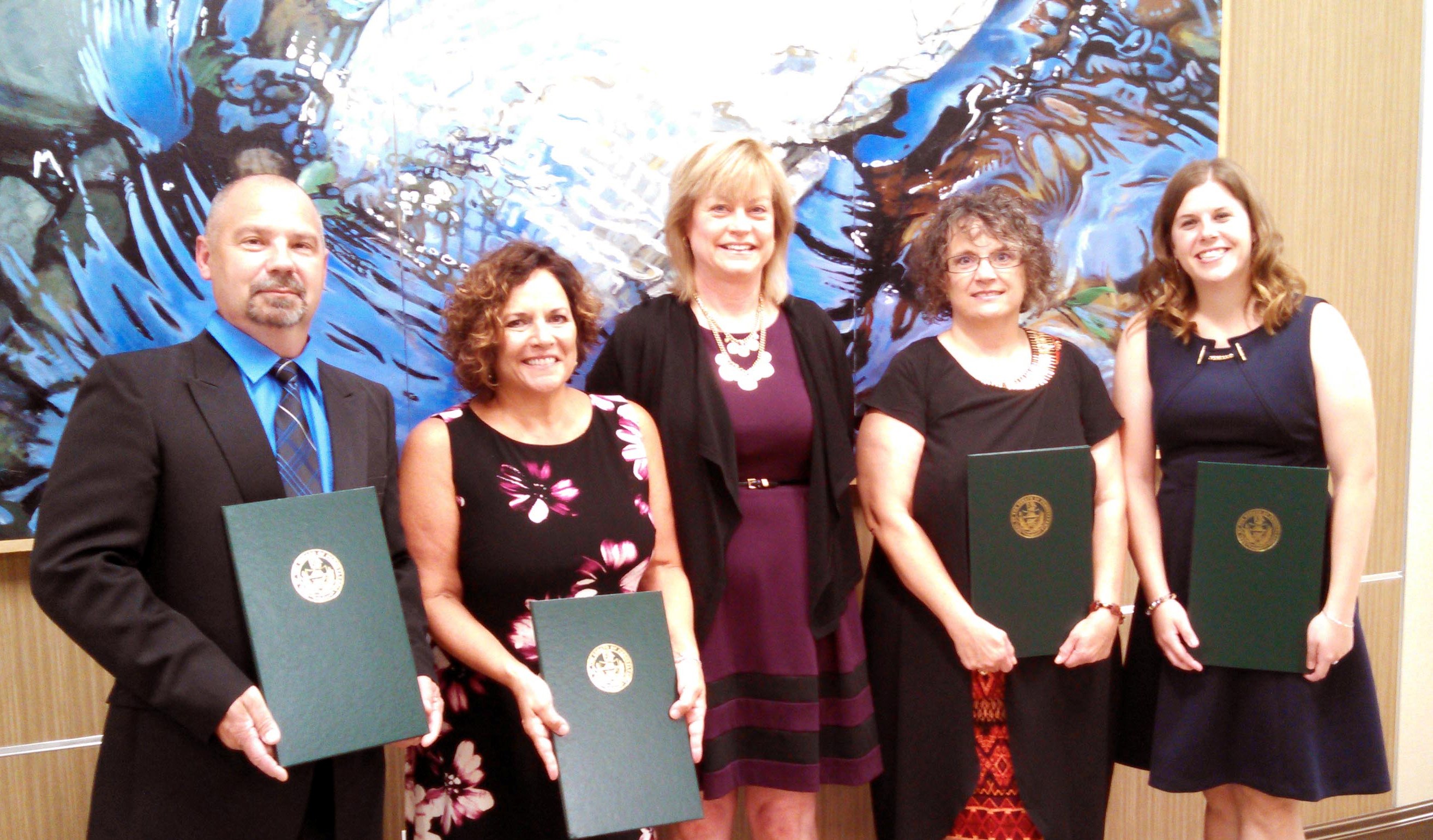
In photo left to right: WSI Team Member Matt Capron, WSI Team Member Vicki Wood, PCADV Executive Director, Peg Dierkers, WSI Team Member Connie Graham, WSI Team Member Corrine Livingston
Nominator: Bruce Harlan, Executive Director, Women’s Services, Inc.
Award Recipient: Women’s Services Prevention Education Program, Women’s Services, Inc.
Women’s Services, Inc. (WSI) is dedicated to educating the public, especially children, about the dynamics of abuse and interpersonal violence, with a special emphasis on personal safety and crime prevention. For over thirty years, Vicki Wood and Connie Graham have been providing quality programs to community members and school children. Together with Matt Capron and Corrine Livingston, the PE Team has over 75 years of practice and experience.
In addition to our community outreach activities, WSI’s Education component provides primary prevention programming to school students in three area school districts. Every year, WSI reaches 7,000 school-age children and youth at Crawford Central School District, PENNCREST School District, and Conneaut Area School District. Children in the school districts begin receiving our programming as early as preschool on through to high school. This programming is composed of the following:
• Three Kinds of Touches - In 2002, WSI developed the “Three Kinds of Touches” preschool curriculum specifically designed for children ages 3 to 5. This curriculum utilizes the children’s book and video, “Three Kinds of Touches,” developed by Women’s Services in 1999 and published by the Pennsylvania Coalition Against Rape.
• Child Abuse Awareness Program (CAAP) – Developed for elementary school-age children in 1986, Prevention Educators teach children to recognize potentially abusive situations by encouraging them to trust their feelings, to be more assertive, to say “no,” and to get away when confronted with an abusive situation.
• Peer-to-Peer Program - In 1997, WSI introduced a 6th grade program designed to explore the dynamics of interpersonal relations. The material introduced in this program centers around the issues of bullying and sexual harassment. Special emphasis is placed on building proactive strategies and reinforces respectful behaviors towards peers and adults. This program compliments the widely implemented Olweus Program.
• Middle School CAAP – Developed in 1991, the Middle School CAAP program reinforces concepts and strategies developed in previous CAAP programs but now include issues surrounding dating violence. Also, students are taught "Active Bystander" skills as a means of reducing violence and bullying in their schools.
• Date Abuse and Teen Education (DATE) - In 1994, WSI developed and implemented this program for high school students, which is also presented as part of their Health Class curriculum. The purpose of this interactive program is to educate students about dating violence and to foster healthy relationships. Through this program, students learn to identify some common patterns of physical, emotional, and sexual abuse, including their potential causes and catalysts. They also learn effective safety strategies that can be employed in a variety of potentially dangerous situations, e.g. active bystander training, assertiveness training, etc.
• Modified Abuse Awareness Program (MAAP) - In 1997, WSI developed this program to meet the needs of students enrolled in Autism, Life Skills, and Learning and Emotional Support classes. Although MAAP is similar in design to other abuse awareness programs, it has been adapted to meet the needs of smaller and more structured classrooms with special emphasis on shorter but more frequent sessions, more detail, and more student interaction. Students are encouraged to explore personal safety strategies and identify individual safety networks.
Prevention Educators also offer what they refer to as QUIET TIME for all school programs. At any time during or after the presentation, students may ask to talk with a presenter privately concerning questions they may have and needed information and/or referrals. Once students have shared their concerns, a referral to their guidance counselor or the Student Assistance Team is made. If a child discloses abuse, as a mandated reporter, the WSI facilitator makes a report to ChildLine/Local Children and Youth Services.
Award Presentation:
The Women’s Services Prevention Education Team was presented the award by Peg Dierkers, VSAC member and Executive Director for the Pennsylvania Coalition Against Domestic Violence (PCADV), during a progressive dinner fundraiser on September 10, 2016.
On behalf of victims of crime and the victim services field, we thank you, Women’s Services Prevention Education Program, for your innovation, collaboration, and unfailing commitment to victims of crime.